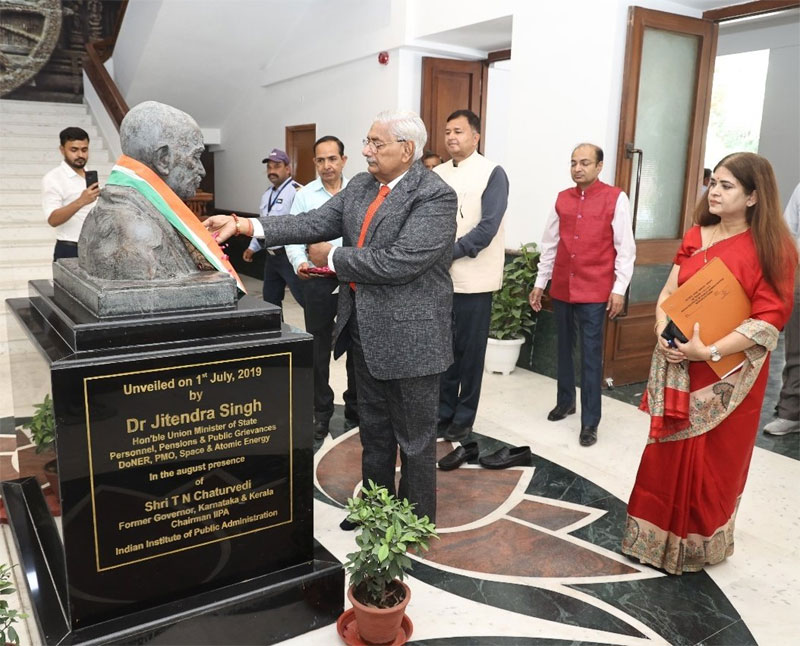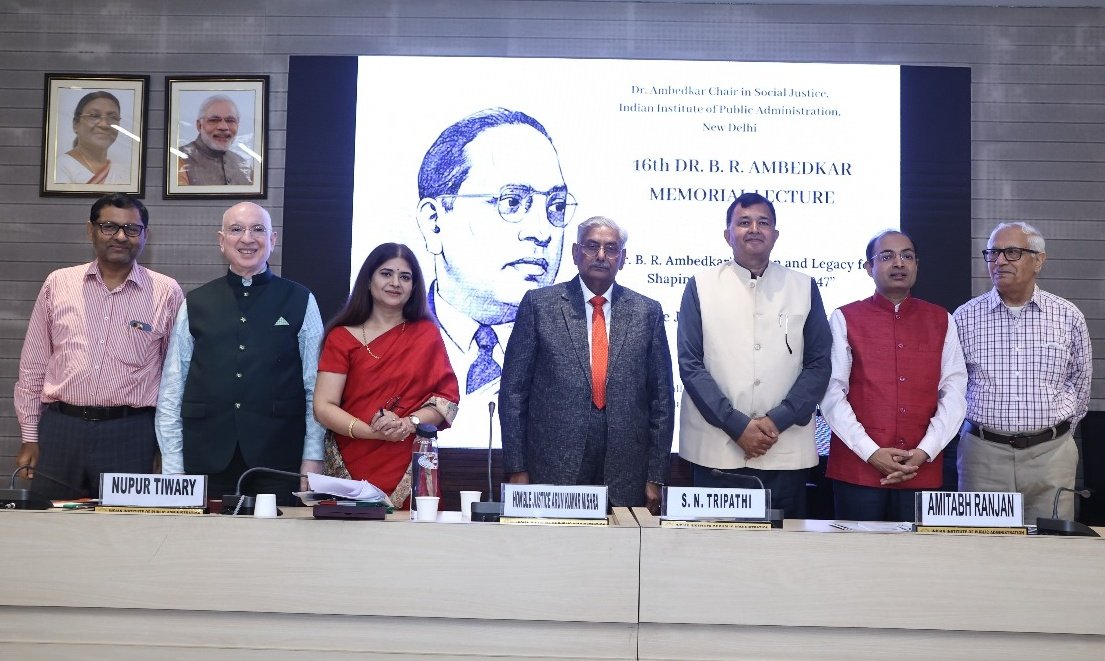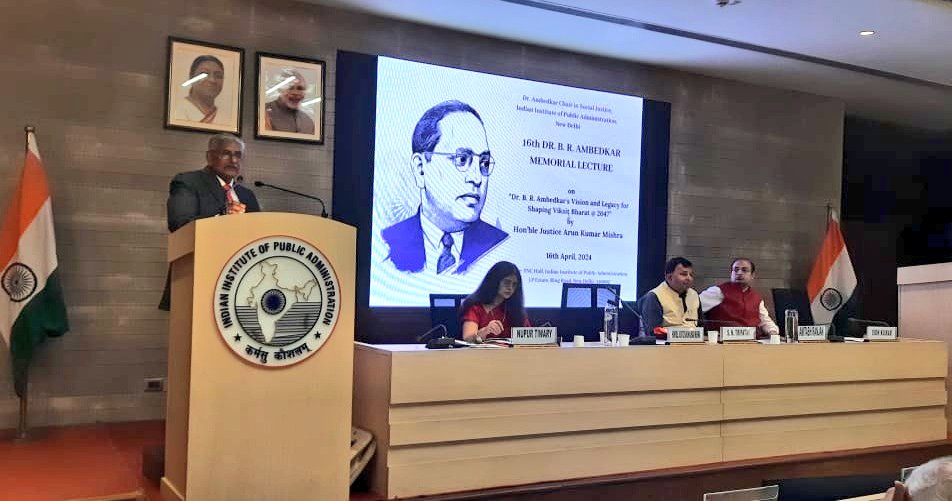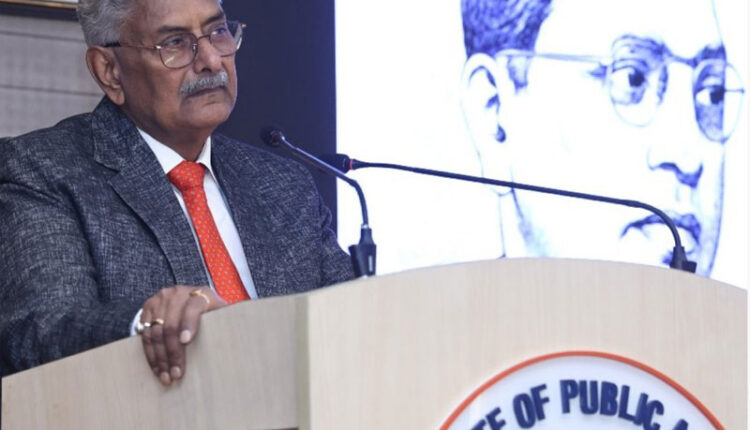- Justice Shri Arun Mishra, Chairperson,NHRC was delivering the 16th Dr. Ambedkar Memorial Lecture at IIPA today
- Says, the GDP growth must result in the good quality of life of the people in line with the constitutional view of development
- Improvements must occur in the quality of life, ensuring material well-being, intellectual and spiritual freedom, and progress
- Reservation yet to trickle down its benefits to the lowest
- Dr. Ambedkar carried forward the concept of equality of Rigveda, which goes beyond the realm of equality defined in the UDHR
New Delhi : Justice Shri Arun Mishra, Chairperson, National Human Rights Commission (NHRC), India said that Dr B. R. Ambedkar’s economic policy recommendations, free-market principles, globalization, liberalization, and privatization are good for today. He was delivering the 16th Dr. Ambedkar Memorial Lecture on “Dr. B. R. Ambedkar’s Vision and Legacy for Shaping Viksit Bharat @ 2047” at Indian Institute of Public Administration, New Delhi today.
The NHRC Chairperson said that Dr. Ambedkar’s legacy inspires future generations to work towards a more just and equitable society necessary for more prosperous and developed nation by 2047. The GDP growth must result in the good quality of life of the people in line with the constitutional view of development. Improvements must occur in the quality of life, ensuring material well-being, intellectual and spiritual freedom, and progress.
Justice Mishra said that as expounded by Maharishi Aurobindo, India will be the world’s moral leader. He said: “The sun of India’s destiny would rise and fill all India with its light and overflow India and overflow Asia and overflow the world.” He said that India is the most successful democracy in the World due to our culture, philosophy, and mutual reverence. We are inching towards Viksit Bharat. Let us resolve to perform our duty without delay and think little for ourselves and more for humanity -“स्वस्मै स्वल्पं समाजाय सर्वस्वं.”

The NHRC Chairperson said that the distribution of giveaways must be pondered upon whether it furthers directive principles or thwarts their objectives. Considering the limited fund resources required for other purposes, including distributive Justice for poor, it may hamper Development itself. There cannot be arbitrary distribution of benefits and State largesse and self-created bankruptcy is no defence to carry out statutory duties and civil obligations.
Similarly, he said that the Directive Principles enumerated in Part IV are fundamental in governance, which overrides, to some extent, an individual’s rights for the betterment of the collective good. Brihadaranyaka Upanishads also aim at collective good and universal human well-being. It says, “ऊँ सर्वे भवन्तु सुखिनः”
The NHRC Chairperson said thatDr. Ambedkar carried forward the concept of equality of Rigveda, which is fundamental to human rights. Rigveda goes beyond the realm of equality defined in the Universal Declaration of Human Rights (UDHR). It instead urges oneness in all our resolutions and actions.
समानी व आकूति: समाना ह्रदयानि व:।
समानमस्तु वो मनो यथा व: सुसहासति॥
“Let there be oneness in your resolutions, hearts, and minds; let the determination to live with cooperation be firm in you all.”

Justice Mishra said that Reservation is a very effective tool for emancipating the oppressed class. The benefit, by and large, has yet to reach the neediest and poorest of the poor. It has not been possible to trickle down the benefit of reservation to the lowest.
He said that there is inequality between various castes included within the List of S.C.s/STs. The benefit is being usurped by those castes (class) who have come up socially and adequately represented in services. In case of hunger, every person must be fed by providing bread. The entire basket of fruits cannot be given to the one. We by affirmative action have to provide benefit of reservation to those who are still deprived of it to achieve vision of Viksit Bharat 2047.
Dr. Ambedkar demanded reservations for OBCs. Although reservation for OBC was implemented following the Mandal Commission in the 1990s, Babasaheb Ambedkar paved the way for them in 1952 in the form of kaka kalekar’s recommendations.
Justice Mishra said that the nation’s future depends on the next generation, and the rights of the child and juveniles are to be specially protected from exploitation. There is immense Human capital potential within marginalized communities. Dalits and the youth. They must be given opportunities and facilities to develop healthily in freedom and dignity and have a right against moral and material abandonment.
He said that the NHRC has recently recommended a hybrid form of education considering the scarcity of teachers in far-flung areas. Our philosophy is “Sa Vidhya Ya Vimuktaye”.
The NHRC Chairperson said that time has come to perform theConstitutional duty under Art. 48 and 51A(g) to protect the trees, rivers, water bodies, flora and fauna and to prevent global warming and protect the environment. A circular economy and recycling by the automobile industry are necessary to reduce greenhouse gases and achieve sustainable development goals.
The NHRC Chairperson said that the constitutional mandate is to form a Uniform Civil Code, which is necessary to abolish discrimination against women. Women are provided safety, security and dignity in the workplace. To empower women, we have to eliminate all forms of discrimination against women on the grounds of gender, particularly in respect of education, employment, inheritance and property. World over, women are discriminated against for civil rights, and there is a necessity for a standard civil code to make men and women equal by clearly defining the parameters of gender equality. Women must enjoy social equality, improved status and participation in economic development.

He said that there is freedom of expression and to obtain information in the country. Media in India have played a central role in sensitising people and providing information about governance. The media’s contribution to revealing and highlighting human rights causes has been most impressive.
Justice Mishra said that the NHRC is committed to achieving the Constitutional vision and in furtherance of it, the Commission has issued various advisories –
(i) Regarding truck drivers – to provide them insurance coverage, halting places, health check-up facilities, adequate remuneration and reasonable working hours.
(ii) The workers involved in the hazardous cleaning of septic tanks must be provided with safety equipment, and mechanised cleaning should be arranged.
(iii) For prevention of ocular trauma, rehabilitation centres for victims, hazardous industries to provide personal insurance coverage for workers, restriction on Chinese crackers, pointed toys and chemicals, and alkaloid having the potential to damage the eye has been recommended.
(iv) Amendment of 97 laws, which are discriminatory to the person with Hansen’s disease.
(v) To prevent self-harm by prisoners, there must be no ligature objects in bathrooms and take care of their mental health.
(vi) CSAM. In an advisory to protect children from online sexual abuse, the liability of intermediaries to remove offensive content and other guidelines have been issued.
(vii) Monitoring of all mental hospitals in the country and ensure mental issues.

